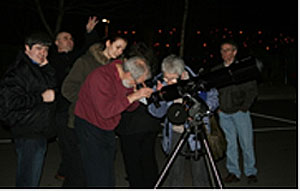Please visit our new site!
Essay
Bringing science down to earth
Dark Skies Wales is a new way to engage
10 May 2009
www.lablit.com/article/500

Rapt: primary school children in South Wales enjoy a close-up view of Neptune
Air-powered rockets, robots and hovercraft would probably entice more people into workshops
2009 is the International Year of Astronomy, and all over the world people are celebrating in a wide variety of ways. From an inspirational and educational point of view, astronomy is arguable one the most wondrous forms of scientific study, so how can we capitalise on the public's interest during this auspicious year?
In 2008 the University of Glamorgan saw an opportunity to expand its science outreach program with a more hands-on form of public engagement. Building upon its excellent reputation for education outreach, the university’s Department of Professional Education and Service Delivery developed Dark Sky Wales (DSW), a new project given free reign to develop innovative and creative ways to engage children and the general public with science and technology.
As a professional astronomer and a Senior Lecturer at the University of Glamorgan, I lead the DSW team. Its basic premise is to develop a program of workshops, adult education modules and open days that introduce individuals to science, technology, engineering and mathematics (STEM) subjects. The activities can be tailored for the group participating and generally contain a large interactive content. For instance, DSW has recently seen the University invest heavily in a state-of-the-art mobile digital planetarium, which has been a great success with shows delivered by professional astronomers on a weekly basis to schools throughout Wales and England. The shows are tailored to the level of the students being taught and place great emphasis on participation, with the presenter actively encouraging peer-led learning. This has resulted in a positive response from those schools participating, with many teachers emphasising the educational benefits of such a facility. They also report renewed enthusiasm and interest in science from students – even children as young as three expressed their appreciation when we asked schools to relay feedback.
The planetarium has also been showcased in Swansea’s Waterfront Museum during the 2009 February half-term period to a general public audience. The response was overwhelming, with over a thousand people experiencing the show and three times that having to be turned away. This demonstration of public interest bodes well for future activities, and is certainly encouraging to those in the informal learning environment.
The planetarium is only one part of DSW's educational arsenal of workshops. We have worked hard to produce innovative ways to engage children and adults alike with STEM activities. This is no easy task, as many of the participants are from some of the most deprived areas of the UK, who as a result often have lesser educational abilities and in turn, a sense of alienation about educational activities. A good example of a disadvantaged area like this is Merthyr Tydfil, where several attempts by the DSW team to engage the general public with workshops and free adult education modules have failed. Undaunted, we began liaising with local groups to see what activities might best suit the locality, and discovered that topics such as air-powered rockets, robots and hovercraft would probably entice more people into workshops.

The plan is to develop simple hands-on activities where parents and children can produce artefacts quickly and easily during family events such as local fetes. Ultimately, the proof of the pudding is in the baking and that will come when DSW delivers this type of activity during the summer months (to keep up with the latest activities, check out our website). Variations of these workshops have been used in the classroom and at family learning events in more affluent areas as well. Their simplicity has seen family groups work and learn together in an enjoyable way with many parents asking for additional activities. Some of these activities can also come with accreditation.
Within its first twelve months, DSW has worked with 12,000 individuals through a combination of science and technology workshops, sidewalk astronomy and the development of two new astronomy-based modules. And the Science Technology Funding Council (STFC) bolstered DSW with a grant to consolidate its current work and to expand into rural parts of Wales. We are now in the process of establishing several Open College Network (OCN) accredited workshops, where parents and children can obtain qualifications in literacy, numeracy and science. Ultimately DSW aims to produce workshops that are not only enjoyable but can also provide valuable qualifications for many individuals who have little or no formal education.
The future for DSW looks bright with new partnerships to be formed with both non-governmental organisations and government agencies. These partnerships will see the development of training programs for staff and general public alike. For example, forestry rangers will be trained to deliver informal astronomy-based learning programs to the general public. These relationships will be fostered with the help of Dark Sky Inspiration, a UK-wide partnership that promotes the awareness and benefits of dark skies. It has provided valuable assistance in DSW's early formation and hopefully will be ever present during our developmental years.
